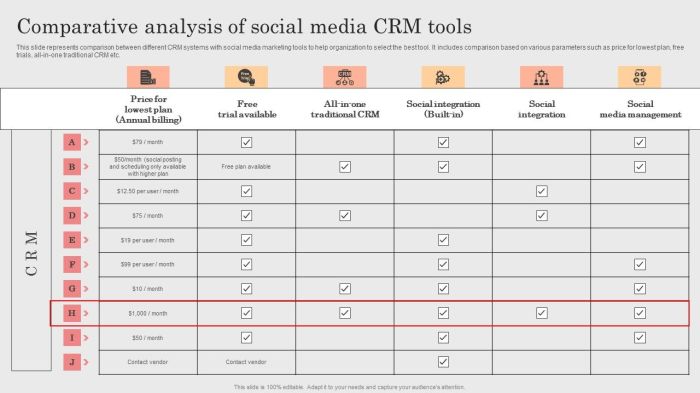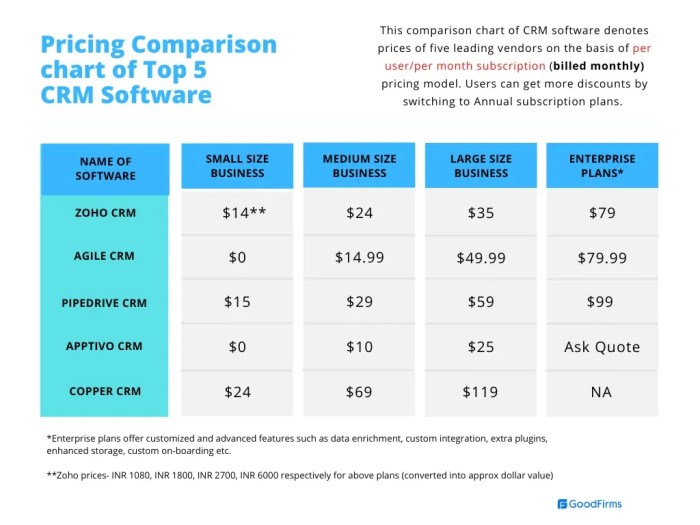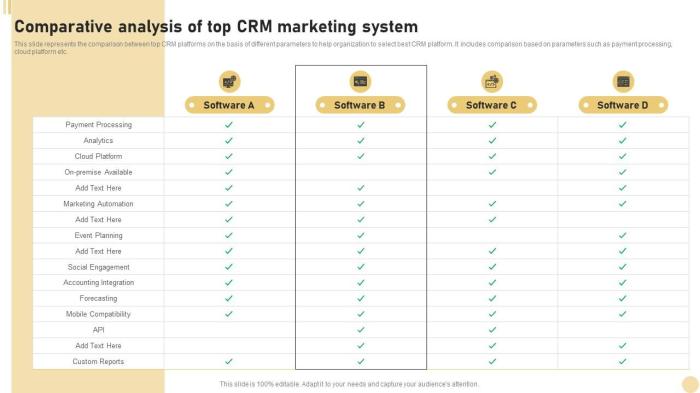Kicking off with CRM software comparison analysis, this exploration delves into the essential features, pricing considerations, and user experience to provide a comprehensive overview of CRM solutions.
As we unravel the intricacies of CRM software, we aim to shed light on how these tools can revolutionize business operations and enhance productivity.
Features to Compare

When comparing CRM software solutions, it is essential to consider a range of features that can impact your business operations significantly. From basic functionalities to more advanced capabilities, each feature plays a crucial role in enhancing customer relationship management and overall productivity.
When investigating detailed guidance, check out RMM mobile app functionalities and benefits now.
Standard Features
- Contact Management: Allows businesses to store and manage customer contact information efficiently.
- Lead Management: Helps track and manage leads throughout the sales pipeline.
- Interaction Tracking: Records interactions with customers across various channels for better engagement.
- Reporting and Analytics: Provides insights into sales performance and customer behavior for data-driven decision-making.
- Email Integration: Enables seamless integration with email platforms for efficient communication.
Advanced Features
- Workflow Automation: Automates repetitive tasks and streamlines processes for increased efficiency.
- AI-Powered Insights: Utilizes artificial intelligence to provide predictive analytics and personalized recommendations.
- Social Media Integration: Integrates social media platforms to track customer interactions and sentiments.
- Mobile Access: Allows users to access CRM data on-the-go through mobile devices for enhanced flexibility.
- Customer Segmentation: Enables businesses to categorize customers based on various criteria for targeted marketing campaigns.
Pricing Considerations: CRM Software Comparison Analysis

In the realm of CRM software, pricing is a crucial factor that businesses need to carefully consider when choosing the right solution for their needs. Different CRM software options offer various pricing models, subscription plans, and tiers, each with its own cost implications and value propositions.
Subscription Plans, CRM software comparison analysis
When it comes to subscription plans, CRM software providers typically offer different tiers based on the features and functionalities included. These tiers often range from basic plans with essential features to advanced plans with more robust capabilities. Businesses need to assess their requirements and choose a plan that aligns with their needs and budget.
- Basic Plan: The basic plan usually offers essential CRM functionalities such as contact management and pipeline tracking at a lower cost. This plan is suitable for small businesses or startups with limited budgets.
- Standard Plan: The standard plan includes additional features like email marketing automation and reporting tools, catering to growing businesses that require more advanced CRM capabilities.
- Premium Plan: The premium plan is geared towards larger enterprises that need advanced customization, integrations, and support services. It often comes with a higher price tag but offers extensive functionalities to meet complex business needs.
It’s essential for businesses to carefully evaluate the features included in each subscription plan and determine which plan offers the best value for their specific requirements.
Cost Implications
The cost implications of different subscription plans go beyond the initial price tag. Businesses also need to consider additional costs such as implementation fees, training expenses, and any customization or integration charges. These hidden costs can significantly impact the total cost of ownership of a CRM software solution.
- Implementation Fees: Some CRM providers charge implementation fees to set up the software and migrate data, which can vary based on the complexity of the deployment.
- Training Expenses: Training costs are another factor to consider, especially if employees need to be trained on using the CRM system effectively to maximize its benefits.
- Customization and Integration Charges: Businesses may incur additional costs for customizing the CRM software to their specific needs or integrating it with other tools and systems.
By factoring in these additional costs along with the subscription fees, businesses can make a more informed decision on the overall affordability of a CRM software solution.
User Experience and Integration

User experience and integration play a crucial role in the effectiveness of CRM software. A well-designed user interface can enhance productivity, while seamless integration with other business applications ensures smooth workflow and data consistency.
User Interface Design
The user interface design of CRM tools is vital for user adoption and overall efficiency. A clean and intuitive interface can help users navigate the software easily, access information quickly, and perform tasks efficiently. Look for CRM solutions that offer customizable dashboards, easy-to-use menus, and clear layout for a better user experience.
Integration Capabilities
Integration capabilities are essential for CRM software to streamline processes and improve data accuracy. CRM tools should seamlessly integrate with other business applications such as email platforms, marketing automation tools, and accounting software. This integration ensures that data is synced across platforms, eliminating the need for manual data entry and reducing errors.